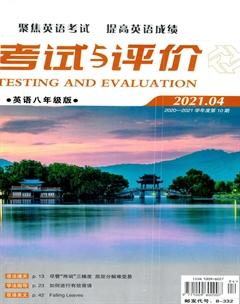Unit 7重點詞語解讀
王秀鳳
1. population n. 人口;群體
作主語,表達一個整體概念時,謂語動詞用單數;當其前有分數或百分數修飾時,謂語動詞可用單數或復數。
The population is increasing faster and faster. 人口增長得越來越快。
【拓展】 (1) 詢問人口數量的句型是:Whats the population of...?
Whats the population of China? 中國的人口有多少?
=How large is the population of China?
(2) 形容人口多少用big, large或small。
The population of China is very large. 中國人口眾多。
China has the biggest population in the world. Its a lot bigger than the population of the US. 中國是世界上人口最多的國家。它比美國人口要多得多。
(3) 表示“某地有多少人口”時,常用“...has a population of...”句型。
China has a population of more than one billion. 中國有十多億人口。
2. protect v. 保護;防護
We should protect rare animals. 我們應該保護珍稀動物。
【拓展】 protect... from / against... 保護……免受/遭……
Parents protect their children from danger. 父母保護他們的兒女不受傷害。
3. succeed v. 成功
succeed是不及物動詞,不能用于被動語態。
Im determined to succeed. 我決心要獲得成功。
【拓展】 success n. 成功;successful adj. 成功的;successfully adv. 成功地;succeed in doing sth. 成功做成某事;succeed in sth. 在某方面獲得成功
His new book was a great success. 他新出版的書獲得了巨大成功。
The performance was successful. 演出很成功。
I finished my training successfully. 我成功地完成了訓練。
She succeeded in passing the exam. 她考試及格了。
Hard work is the name of the game if you want to succeed in business. 要想生意旺,勤奮工作是關鍵。
4. prepare v. 準備
I had no time to prepare. 我當時沒時間準備。
【拓展】 prepare sth. for sb. / sth. 給……準備……;prepare to do sth. 準備做……;be prepared for sth. 為……做好了準備(強調狀態)
She prepared a nice breakfast for us. 她給我們準備了可口的早餐。
I prepare to take some food with me when climbing the mountains. 我準備爬山時帶些食物。
They were prepared for the worst. 他們已準備好了應付最壞的情況。
5. challenge v. & n. 挑戰;考驗
The job doesnt really challenge her. 這項工作不能真正考驗出她的能力。
【拓展】 (1) challenge sb. to sth. 向某人挑戰;challenge sb. to do sth. 向某人挑戰
He challenged me to play chess. 他向我挑戰下象棋。
John found it a challenge to satisfy the boss. 約翰覺得讓老板滿意是一個挑戰。
(2) challenge作可數名詞,意為“挑戰、比賽等的邀請”。face a challenge面臨挑戰;meet the challenge of... 迎接……的挑戰;accept / take up a challenge 接受挑戰。
Schools must meet the challenge of new technology. 學校必須迎接新技術的挑戰。
We accepted their challenge to a baseball game. 我們接受了他們棒球邀請的挑戰。
6. include v. 包含,包括
為及物動詞,其后可接名詞或動名詞,指在一個整體中包括了其中一部分內容或項目等,強調包含部分。
The price includes both the house and the furniture. 價錢包括房子和家具(的價格)。
Your duties include putting the children to bed. 你的責任包括安頓孩子們去睡覺。
【拓展】 including作介詞,意為“包括……在內”,后面跟名詞或代詞,在句子中作狀語,是對主句的補充說明,一般用逗號與主句隔開。
He took an active part in all kinds of activities, including tennis, swimming, running and so on. 他積極參加各種活動,包括網球、游泳、跑步等等。
7. condition n. 條件;狀況
既可作可數名詞,也可作不可數名詞。
Everything is in good condition. 一切狀況良好。
He is overweight and out of condition. 他體重超重且健康狀況不佳。
【拓展】 in good / bad / excellent condition 狀況好/糟糕/極佳;out of condition 健康狀況不佳;living / working conditions 生活/工作條件;under the condition that 在……的前提下
8. achieve v. 達到;完成;成功
及物動詞,其賓語可以是“實現”的目標、目的等,也可以是“取得”的勝利、成功、名譽、地位等。
She achieved no success. 她沒有獲得成功。
【拓展】 achievable adj. 可達到的;achievement n. 成就;成績
As we reached the top of the mountain, we felt a sense of achievements. 當我們到達山頂時,我們感到有一種成就感。
【辨析】 achieve, come true的區別
achieve指實現夢想或目標,主語是人;come true主語多是夢想、藍圖、計劃等。
He hopes to achieve all his aims soon. 他希望盡快達到所有目標。
At last, his dream came true. 最后,他實現了他的夢想。
9. up to 到達(某數量、程度等);至多有;不多于
There are up to forty students in the classroom. 教室有40多個學生。
【拓展】 live up to活到……歲;up to sb. 某人的責任;由……決定
Nowadays people can live up to ninety years. 現在人們能活到九十歲。
I think I will leave it up to you. 我想讓你決定。
10. feel free 隨便,輕松
You will feel free and fresh from time to time. 你不時地會感到自由,精神飽滿。
【拓展】 feel free to do sth. 無拘束做某事
If you have any questions, please feel free to ask me. 如果有任何問題,請隨意向我提問。
11. even though 即使;盡管
用作從屬連詞,相當于even if,引導讓步狀語從句,不與并列連詞but連用。
Even if you dont succeed, they will stand by you. 即使你們不成功,他們也會支持你們。
Even though I have opposed him, he is an honest man. 盡管我反對過他,但他是一個誠實的人。

